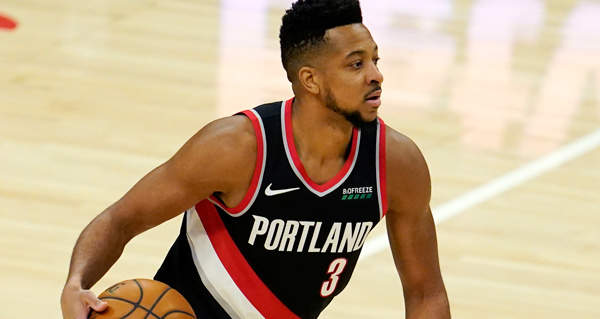The implication, buried beneath a hundred other things—accusations and disappointments, animal restlessness, valid critiques of Neil Olshey’s job performance, the fact that the Blazers have employed at least half a dozen small forwards who can’t shoot, the terror of waking up 31 years old, myth-building, inexpert press handling, anxiety as strong as paint fumes—is that C.J. McCollum isn’t good enough. Dame Lillard will tell you that’s not what he means, when he grumbles about the lacking team that’s been constructed around him. He’s telling the truth. He adores McCollum. But when you’re unhappy with your situation, a championship being a wholly cumulative achievement—every little bit counts and the source of the necessary production doesn’t particularly matter; three guys can score 10 or one can score 30—you’re talking about each component of the machine failing, to some extent. (Yourself included.) Lillard would probably argue, not so explicitly but in so many words, that C.J. should be Portland’s third banana, or that there should be such a robust rotation behind he and his faithful sidekick that McCollum’s shortcomings—his slightly dodgy fit next to Dame chief among them—don’t matter. Dame would insist that C.J. is a very good player. And he is. But what if he were better? Well, shoot.
We have a tendency to devalue scoring, in 2021. The game is freer than it has ever been, it’s been posited by dismayed pundits that anybody with a jumper and a decent handle can put up 22 points per game on the right, bad squad. You might be inclined to believe that, if you skimmed the Basketball Reference pages of the league’s assorted lottery-dwellers—somebody has to score—but there’s a meaningful difference between what, say, Jerami Grant was doing last year and what C.J. McCollum has been doing for many seasons now. Efficiency is the obvious aspect of it, easy to discern by glancing at shooting percentages, but it also means something to perform when most of your games are close and your opponent is locked in, when you’re pushing for the playoffs or featuring in them. And C.J. doesn’t get to do whatever he wants; he posts his 20-whatever in the negative space Dame Lillard leaves in his wake. There are odd nights when C.J. has the feature role, when he’s got the gotter hand, but for the most part he operates flanked by bench units, running off screens and not getting the ball three times in a row, and then on the fourth, he’s uncovered and needs to nail the shot. It’s a peculiar rhythm you have to strike, not being The Guy but playing as if you were, however intermittently. It’s immensely difficult to be Dame or LeBron or Steph—of course it is—but it is also difficult, in ways that all-consuming megastars maybe can’t totally appreciate, to be C.J. or Kyrie or A.D. or Klay.
It’s worth pointing out, though it feels mean, that McCollum isn’t as quite as good as those latter three, and isn’t so good that you don’t question whether the Blazers should have already swapped him out for, if not a superior talent, then someone with a different skillset. There are crude measures—gut feelings, the stuff of bar arguments and podcast bluster—that seem sometimes more correct for their crudeness. Does the Dame and C.J. partnership truly work? Not really. Not if you measure success in titles, or even title contention. It’s tough, perhaps impossible, to run two smallish, no-defense guards out there in the postseason, and reach your ultimate goal. Would two Dame-level guards do it? A useless hypothetical. McCollum equals himself; he’ll never look as impressive as he genuinely is if you’re measuring him against his absurdly great backcourt-mate. Dame helps you succeed on the court and yet you suffer in comparison, because you can’t match his level. McCollum, for his part, seems pleased with the first part and largely unconcerned with the second.
Portland seems at a crossroads, but does change feel imminent? The Ben Simmons for C.J. McCollum chatter has died down for now but will probably build to a low roar as the season approaches, and be present at every point from about mid-October until Simmons is finally shipped out, or something else big happens with the Blazers. Dame Lillard is more than entitled to be unhappy, but it’s unclear how Olshey is supposed to overhaul the enterprise without moving his buddy, and if even that would bring about the meaningful change Dame seeks. It drives you crazy, being great on a not-great team.
It’s disorienting to imagine C.J. McCollum playing anywhere else. We understand him completely as Dame’s other half—or other third. You can picture him thriving almost anywhere, because scoring translates, but it wouldn’t look right, at least for a while, to see him in Heat red or Sixers blue. Drape him in a Rockets jersey, just for the hell of it. Discomfiting stuff. For all the concerns about Dame and C.J.’s partnership, the gap between what the Blazers require and what he provides, desperation in the front office, the simple accumulation of time has created the impression that McCollum will be in Portland forever, that it’s where the universe wants him. He could get traded in the next few months, but some persistent voice inside you says that he won’t. Of course, that voice holds no authority and the NBA is fluid as a stock exchange, when two GMs are willing. We have every reason not to trust our unfounded cornball intuition. And yet it insists.
Eleven Other Characters: Russell Westbrook | Zach LaVine | John Collins | Domantas Sabonis | Bam Adebayo | Devin Booker | Draymond Green | Julius Randle | Kyrie Irving | Khris Middleton | Joel Embiid



